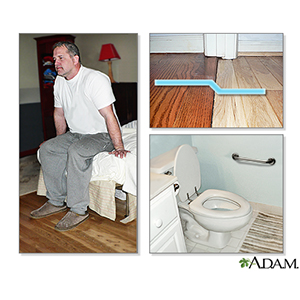WHAT YOU NEED TO KNOW: What increases my risk for falls? Health conditions which cause changes in your blood pressure, vision, muscle strength and coordination may increase your risk for falls. Medicines may also increase your risk for falls if they make you dizzy, weak, or sleepy. How can I help protect myself from falls? - Stand or sit up slowly. This may help you keep your balance and prevent falls.
- Use assistive devices as directed. Your healthcare provider may suggest that you use a cane or walker to help you keep your balance. You may need to have grab bars put in your bathroom near the toilet or in the shower.
- Wear shoes that fit well and have soles that grip. Wear shoes both inside and outside. Use slippers with good grip. Avoid shoes with high heels.
- Wear a personal alarm. This is a device that allows you to call 911 if you need help. Ask your healthcare provider for more information.
- Stay active. Exercise can help strengthen your muscles and improve your balance. Your healthcare provider may recommend water aerobics or walking. He may also recommend physical therapy to improve your coordination. Never start an exercise program without asking your healthcare provider first.
- Manage your medical conditions. Keep all appointments with your healthcare providers. Visit your eye doctor as directed.

|
How can I make my home safer? - Keep paths clear. Remove books, shoes, and other objects from walkways and stairs. Place cords for telephones and lamps out of the way so that you do not need to walk over them. This will prevent you from tripping.
- Remove small rugs or secure them with double-sided tape.
- Do not walk on wet surfaces. Use nonskid mats in the bathtub and shower.
- Install bright lights in your home. Use night lights to help light paths to the bathroom or kitchen.
- Keep items you use often on shelves within reach. Avoid using step stools.
- Paint or place reflective tape on the edges of your stairs. This will help you see the stairs better.
|